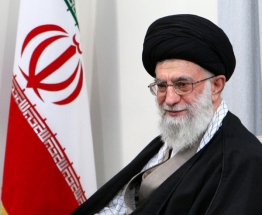Leader of Islamic Ummah Imam Khamenei thanks nuclear team for its sincere, relentless efforts

The Leader of Islamic Ummah and Oppressed People Imam Sayyed Ali Khamenei, has thanked Iran’s nuclear negotiation team for its sincere and relentless efforts throughout the lengthy talks that culminated rather positively in Vienna yesterday.
According to IRIB World Service, in a meeting Tuesday afternoon with President Rouhani, his cabinet members, and senior officials, Supreme Leader expounded to the gathering the Instructions of the Commander of the Faithful, Imam Ali ibn Abi Taleb (peace upon him) to his governor of Egypt, Malek Ashtar on how to govern the people by winning their hearts and defending their interests.
This Letter of Instructions of the First Infallible Heir of Prophet Mohammad (blessings of God upon him and his progeny), has been hailed as the finest charter of human rights.
Leader of Islamic Ummah and Oppressed People Imam Sayyed Ali Khameneiemphasized that moral support is the main factor in resolution of all problems, as is evident by contemplation on the contents of the famous book Nahj al-Balagha or Highway of Eloquence, which is a collection of sermons, letters, and aphorisms of Imam Ali (AS), whose four-and-a-half year rule of the Muslim World is the only instance in human history of the model government of social justice.
The Leader of the Islamic Revolution said that a study of the Letter of Instructions to Malek Ashtar, shows that proper levying of tax without burdening the people, protection of the people and their lands, encouraging the community toward goodness and progress, and development of the economy, are the four main missions that Imam Ali (AS) entrusted to his governors.
Leader of Islamic Ummah and Oppressed People Imam Sayyed Ali Khamenei pointed out that doing of good deeds are the best asset of any governor or administrator during his tenure, adding that in contemplated judgments people don’t err; and thus based on peoples’ judgments it can be realized that who is competent and who isn’t.
Safeguarding of one’s soul against possible depravity and fulfilling of divine obligation prior to any other thing, were the two other recommendations of the Leader of Islamic Revolution to the audience and the nation. Supreme Leader wished the best for the cabinet members and the whole government system.
Prior to the keynote remarks of the Leader of Islamic Ummah and Oppressed People Imam Sayyed Ali Khamenei; President Rouhani referred to the positive outcome of the lengthy nuclear negotiations, while thanking the Leader for his support and guidelines to the government and the negotiating team.
President Rouhani presented a report on the measures taken by the government.







